Life after Boonen: Quick-Step juggernaut rolls on
'If you think only 'me, me, me' you’re in the wrong team' says Lefevere
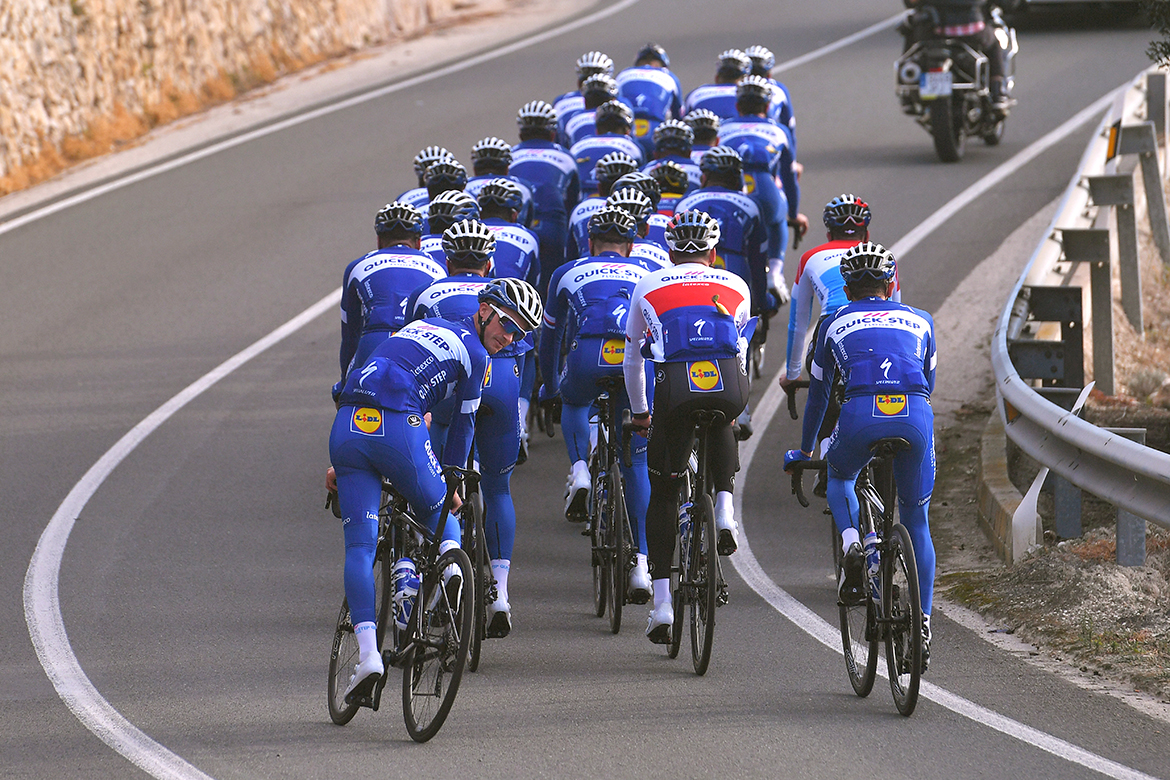
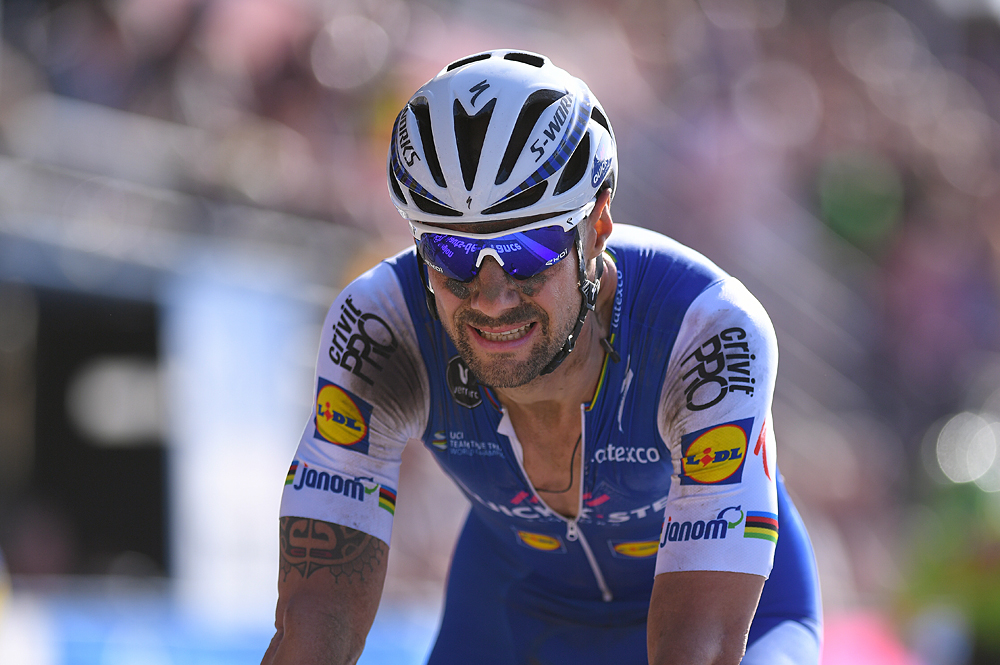
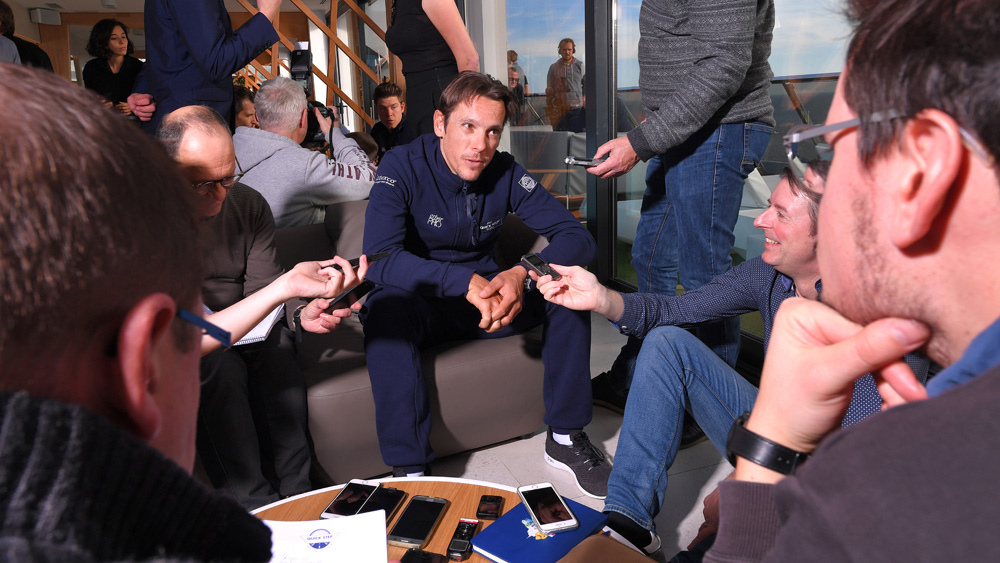
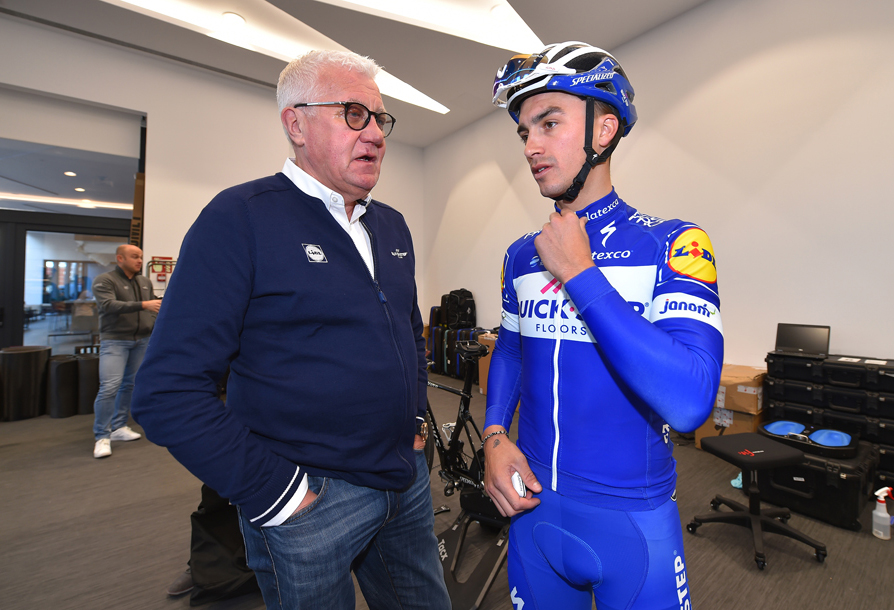
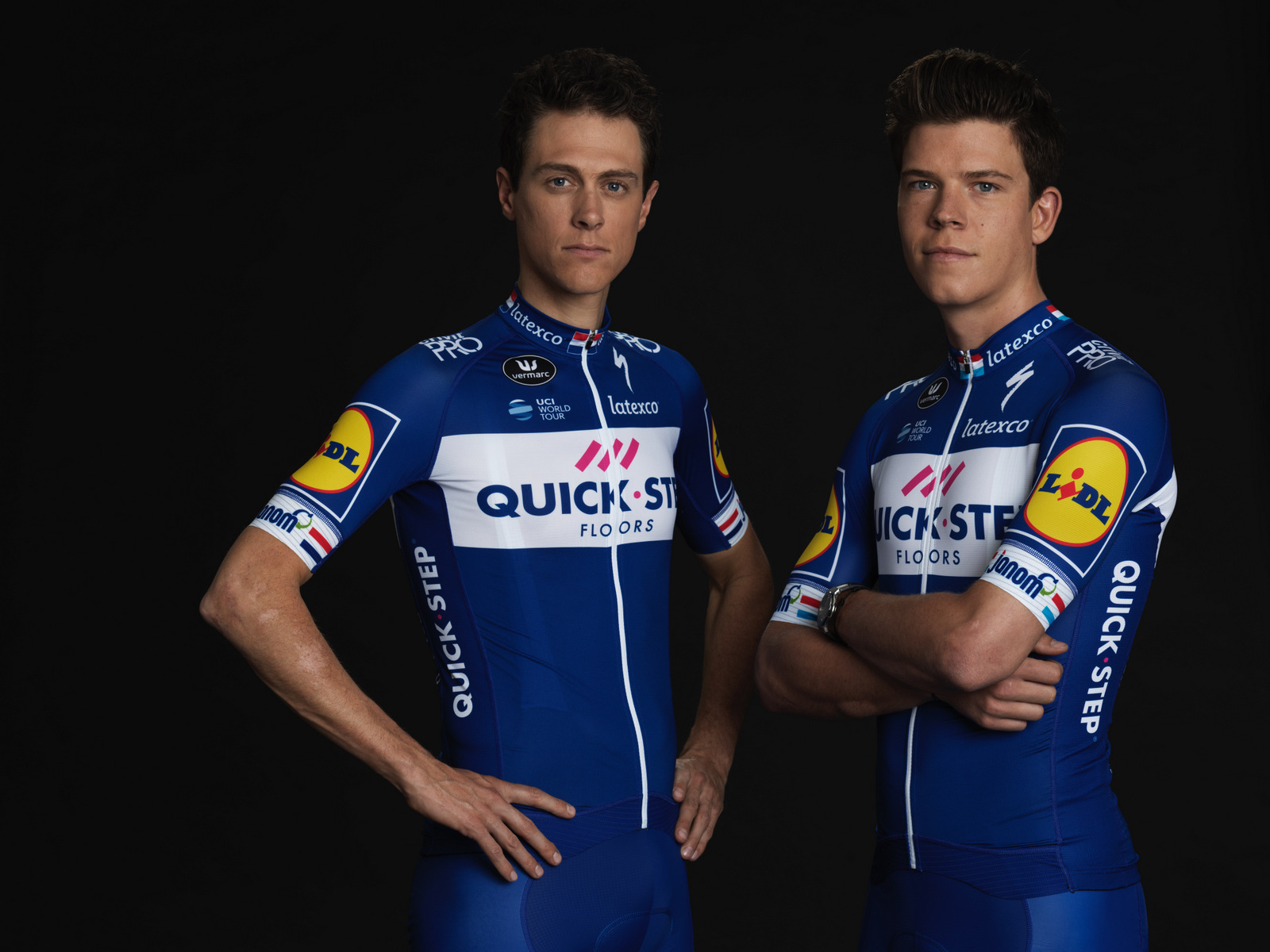
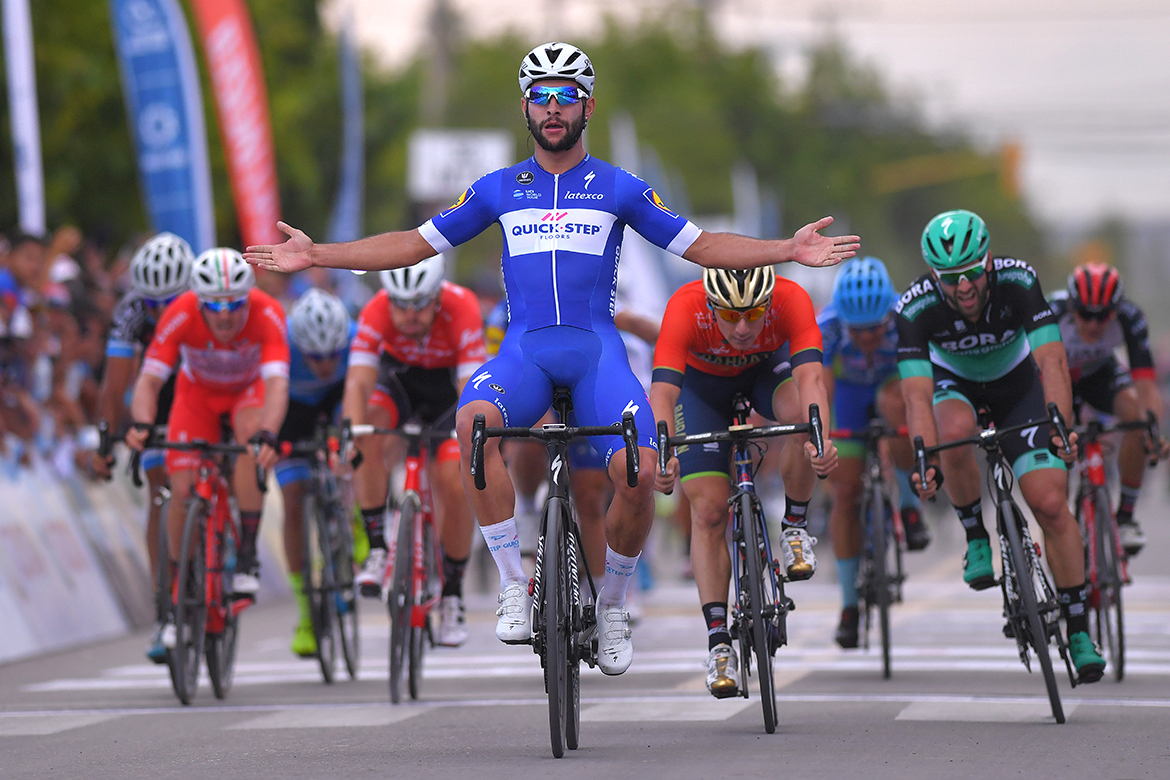
Life after Tom. It was never going to be easy.
"Everyone knows what Tom meant to our team and to me," Patrick Lefevere says ruefully, sitting down with Cyclingnews as Quick-Step Floors gather in Calpe for their 2018 team presentation.
Tom Boonen retired last April on the Roubaix velodrome, bringing an end to an illustrious 16-year career, 15 of which were spent riding under Lefevere at Quick-Step. With seven monuments, a world title, and much more besides, Boonen was the poster boy for the Belgian team, his charisma and star quality extending far beyond the cycling fandom and into the mainstream.
"In life, you can never replace somebody - every single person is unique," says Lefevere. "Johan Museeuw was unique, or Cipollini, or Ballerini. All these big guys I never had in my mind I will replace him. Everyone is irreplaceable."
The task for the 62-year-old manager is to ensure there's always new talent ready to step in, to ensure - to borrow a Flemish adage - that the tributary never runs dry.
"When Cipollini stopped everyone said: 'What now? You will fall into a black hole'. And Tom Boonen was there. When Bartoli broke his knee, Bettini was there."
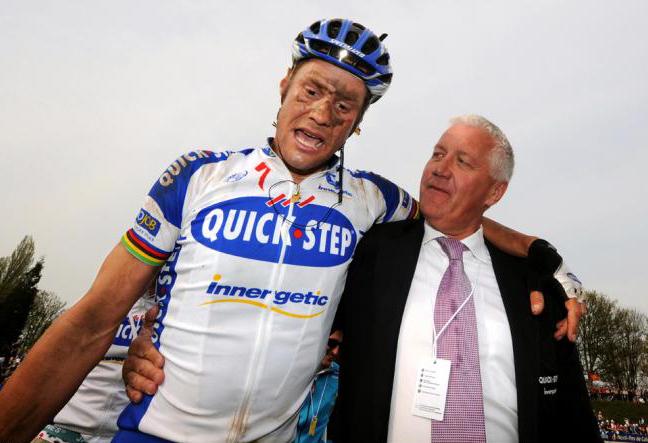
Indeed, the Quick-Step juggernaut rolls on in the post-Boonen era. Even in the remainder of the 2017 season they won 34 races, and they embark on the 2018 campaign full of confidence and optimism.
Get The Leadout Newsletter
The latest race content, interviews, features, reviews and expert buying guides, direct to your inbox!
Fernando Gaviria is in his third season as a pro and looks set to continue his prodigious rise. Julian Alaphilippe, similarly, looks to have a huge palmarès ahead of him, while Bob Jungels will have the chance to lead the team at the Tour de France. All three are under the age of 25 and signed new contracts in the summer, while Marcel Kittel, winner of five stages at last year's Tour, had to move on. It's part of a noticeable investment in youth - with the signing of four neo-pros this winter, the team has one of the youngest rosters of its near 20-year history.
"If I have to say one of my strengths, it's that I'm able to build a team with a mix of very young people and very experienced people, and in between them there has to be enough quality to survive," says Lefevere. "In 2000, I built Mapei with 40 riders, and I had 10 riders who were 18, 19 – Pozzato, Cancellara, Evans, Eisel, Rogers."
Where the balance comes, and where Boonen's absence is perhaps offset, is in 35-year-old Philippe Gilbert, who signed with the team last year and immediately won the Tour of Flanders.
"What I miss the most – and I hope it will not be like this – is that when Tom was at a race on the bus everyone was relaxed. So will the riders with ambition but without the palmarès of Tom be nervous? Philippe Gilbert is very important in that respect. I was very surprised that a rider the age of Zdenek Stybar said to me 'Patrick, really, thank you for signing Philippe. I didn't expect but he gives us so many good tips'."
Options
Even without Boonen, Quick-Step once again have a remarkable level of strength in depth. It has sometimes been cited as a drawback when things have veered from the script, but having options has become something of a hallmark of the team.
Along with losing Boonen and Kittel, Matteo Trentin has left for Mitchelton-Scott. However, the still the team has at least two, if not three, viable contenders for all major Classics, the one-day races that are still the lifeblood of a team which is based in the Flanders region of Belgium.
Gaviria is surely a Milan-San Remo winner in waiting, while Alaphilippe finished on the podium there last year, and Gilbert wants to add it to his palmarès this year as he looks to complete the Monument set. For the cobbled Classics, Gilbert was imperious last year in winning the Tour of Flanders. Paris-Roubaix is the other missing piece in his Monument jigsaw, but the team also has Niki Terpstra – a former Roubaix champion – and Zdenek Stybar, twice a podium finisher. Yves Lampaert, too, came of age last year with victory at Dwars Door Vlaanderen.
In the Ardennes and other hillier Classics, things are slightly more clear cut after Dan Martin's departure to UAE Team Emirates. Alaphilippe will lead the line but Jungels will play an important role, too, while Laurens De Plus is another promising youngster and Gilbert could still decide to have a crack again.
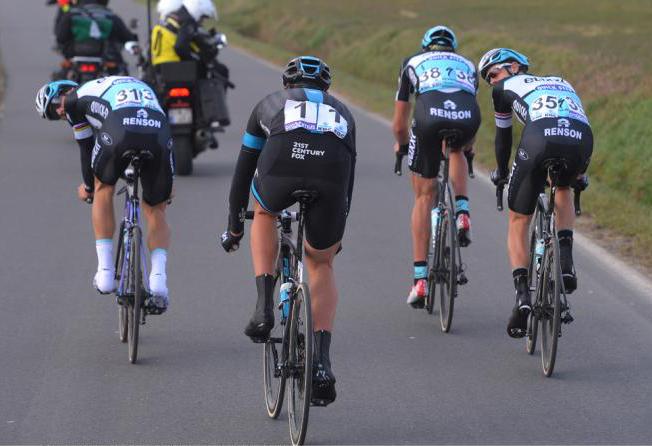
"For a long time, everyone has said to me, 'how will you handle all these champions to work together?'" says Lefevere.
"It's easier to work together than to fight. If you work together, one day or another you will win. I will win, and you will win. Of course, it's not always pleasant if you work and the other wins, but I'm convinced in modern cycling that being in a group that's ready to fight for each other, you'll go far. Here in this team, we make a kind of stamp through all my years, that we are winning together. One day you win, one day I win. If you think only 'me, me, me', you're in the wrong team.
"I try to make a team where the responsibilities are shared. What I like a lot is when we win, and it's you winning but they see you happy because the other guy is winning. I saw one rider one day and he was not happy. I put him out of the team. He was jealous. You can't be jealous. There's a healthy jealousy and there's a bad jealousy, and if you don't like your teammate winning, you have no place in my team."
In a round table interview later in the day, Lefevere strikes on the perfect example: last year's Dwars Door Vlaanderen. Quick-Step let rip on the race as only they can, and when the dust settled they had two men, Gilbert and Yves Lampaert, in the decisive selection of four. Gilbert had split the race to pieces with 75km to go and looked frighteningly strong but, working over their isolated rivals, victory would come from whichever attack would finally snap the elastic. As it happened, it was Lampaert, who grew up on a farm mere kilometres from the finish line and for whom the magnitude of the achievement was plain to see.
"If you take Dwars Door Vlaanderen, with all respect for Yves Lampaert, if Philippe wants, he goes to catch Yves," says Lefevere. "In the end, Yves wins, Philippe is second, and you see the happiness. He enjoyed it, but then a week later is Flanders. Then in this moment if you ask something of Yves Lampaert, and your name is Philippe Gilbert, he does everything for you. That's giving and taking. This has always been the strongest thing in our team."
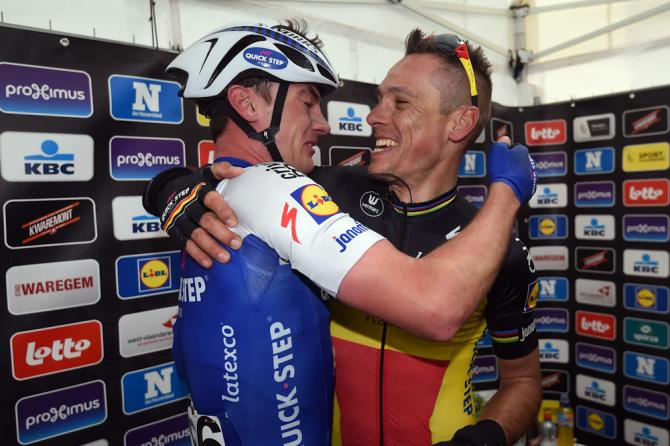
On paper, Gilbert would seem to be the biggest concern when it comes to sharing round the opportunities. The Belgian has made no secret of his audacious ambition to win all five Monuments - the team has even rolled out a hashtag, #StriveForFive - but by the time his contract runs out in 2019 he'll be 37, leaving him little time to let opportunities slip by.
"Maybe in events like this, but on the bike it's always different," Gilbert said when asked, in one of many group interviews in Calpe, if he feels like the patron of the team.
"On the bike you have to fight for yourself also. We're going to be there with a few guys, so you have to be the best. I think if you're already the best in Quick-Step you have a big chance to win, so it gives us always a rivalry inside the team but in a good way, like we push each other to be the best and that's why we're so successful.
"The good thing is we don't need me, because we have many other guys, so that's something important. Everyone has less pressure because we have a really wide leadership. [In the Ardennes] I know if Julian has no bad luck like last year he will be there, Bob will be there, so actually they don't need me, and if I'm there it's a bonus. In the Flemish races it's the same, there's always another one."
The rest of the riders sang from the same hymn sheet.
Gaviria said he was appreciative that the team has backed him as their main sprinter but quickly turned the attention to his teammates, mentioning Elia Viviani and new signing Fabio Jakobsen. Talking about the cobbled Classics, he said, "If the team needs a gregario I'll go as a gregario, if they need someone to try and win I'll go and try to win." As for Milan-San Remo, "If me and Gilbert both go then why not attack on the Poggio, or on the Cipressa. It's two cards to play, when the other teams will only have one."
Jungels insisted that 'attack is the best defence'. "When you have three cards to play it's always easier than if you have one and it doesn't work," he said. "Of course it's always going to be one or two guys named as leaders but this is a team where everyone gets a chance. If Laurens De Plus is in a breakaway and close to the finish in Liège, everyone will be more than happy. That's one of the strengths of this team, not to focus on one rider but having lots of cards to play."
Lefevere, it seems, has succeeded in ensuring his riders wholeheartedly buy into the philosophy he outlined above. They've even got a nickname for it now: The Wolfpack. It was coined a couple of years ago by directeur sportif Brian Holm, and has caught on to such an extent that a wolf icon is now stitched onto the back of the jersey and wolf howls can often be heard from the team's dinner table when toasting a victory.
"A Wolfpack is a family, it moves together and lives together; no one gets left behind, because a Wolfpack's strength is unity," reads an explainer on the team's website.
It could come across as a corny marketing gimmick, but, spending a little time around the team, it does seem to encapsulate what appears to be an authentic team spirit and winning mentality. Boonen may be gone but Quick-Step are still Quick-Step.

Patrick is a freelance sports writer and editor. He’s an NCTJ-accredited journalist with a bachelor’s degree in modern languages (French and Spanish). Patrick worked full-time at Cyclingnews for eight years between 2015 and 2023, latterly as Deputy Editor.
